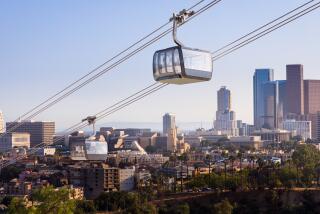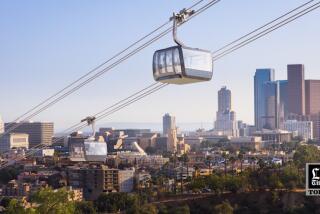How much could the Rams and Chargers make in their new stadium? We ran the numbers
The Rams and Chargers came to Los Angeles for one simple reason: money.
More specifically, the financial benefits from moving to the nation’s second-largest market and into a cutting-edge $2.66-billion stadium.
But how much will Rams owner Stan Kroenke and Chargers owner Alex Spanos benefit from settling in Inglewood?
It’s hard to say definitively, but, in sum, a lot.
Each team could top $350 million in annual revenue — considerably more than in either of their previous homes, according to a Times analysis and interviews with NFL team sources, academics and sports business experts.
What’s more, the owners could pocket hundreds of millions, if not billions, of dollars down the line as their teams appreciate in value.
But first, some disclaimers.
NFL teams — with the exception of the community-owned Green Bay Packers — are private enterprises and don’t release financial information.
There is also the complicated nature of the stadium project. The venue will be surrounded by a 298-acre mixed-use development featuring entertainment, retail, housing and office space that Kroenke is building and financing separately.
We focused exclusively on the costs associated with building the stadium and the revenue derived from it.
One crucial factor we can’t estimate is whether the Rams or Chargers — who managed a combined nine wins this season — will be worth watching in two and a half years. That could have a big effect on how much the teams might make on offerings such as luxury suites, tickets, parking and concessions.
We’ve also focused on the teams’ potential revenue, not their profitability.
But with pro sports teams, annual profit isn’t really the primary goal anyway. Some owners just enjoy the bragging rights and the possibility of a huge cash out if they sell. Teams in bigger markets are typically worth more.
Forbes magazine figured the Rams were worth $1.45 billion in their last year in St. Louis and doubled that to a whopping $2.9 billion after the team moved.
The Chargers’ value was put at roughly $2.1 billion last year, up more than $500 million from the previous year — an increase largely attributed to the team’s possible move to L.A. The valuation could climb further now that the team has relocated.
“The Spanos family might be willing to take losses in the short term because they’ll get billions when they sell,” said Rick Burton, a sports management professor at Syracuse University. “If the Clippers are worth $2 billion, what are the Chargers, who are in a larger league, suddenly worth?”
Personal seat licenses
The biggest single source of revenue for either team, and for the stadium where they’ll play, could be personal seat licenses, which have emerged over the past two decades as the NFL’s golden goose for funding stadium construction or renovations.
Seat licenses are a largely one-time source of funding that give fans the right to buy prime season tickets for years to come. Licenses are generally valid for the life of the stadium and fans can even resell them. But there’s a big catch: Fans have to buy season tickets each year — including to two preseason games — or forfeit the license.
Both the Rams and Chargers have noted on their websites that licenses will probably be sold for “most if not all” seats. Each team would keep 18.75% of its license revenue, with the rest going to pay for the stadium, according to a source familiar with the deal.
We estimate that the Rams and Chargers could each generate $97 million for themselves and a combined $842 million for the stadium. The Times has reported Kroenke plans to partially fund construction with a $1-billion bank loan, and both teams also can borrow $200 million from the league to help build the facility.
The seat license revenue estimate assumes both teams sell licenses for every seat in the new venue, and that they sell licenses for an average of $8,000 — the average price fans paid for seat licenses at Levi’s Stadium, home of the 49ers, where prices ranged from $2,000 to $80,000 per seat.
Team owners like seat licenses because they raise money for posh stadiums without tapping public coffers, which has become increasingly difficult.
For fans, though, seat licenses are an expensive gamble that may not pay off in the long run.
For some successful teams, such as the Steelers and Ravens, the value of seat licenses more than doubled as years passed and fans could profit by selling them. Fans of the recently woeful 49ers, with seven wins in the last two seasons combined, have not been so lucky.
Over the last 12 months, more than 900 seat licenses for Levi’s Stadium in Santa Clara have changed hands through the stadium’s official secondary marketplace. Some have sold for more than their original face value, but the vast majority — nearly 800 — have sold for less. And almost 300 seat licenses have sold for less than half of face value.
If the Rams or Chargers sell seat licenses, it would be a first for Los Angeles professional sports.
“PSLs will be a moment of truth for L.A.,” said a representative of a competing sports enterprise who was speaking off the record. “The sticker shock will be incredible.”
TV deals, luxury suites
The biggest and most reliable source of annual revenue is what the 32 teams divvy up from the NFL’s billion-dollar TV deals, merchandise licensing and national sponsorships — think “the official (fill in the blank) of the NFL.”
For the 2015 season, that amounted to $222.6 million per team, according to a report from the Green Bay Packers.
Outside of the shared money, we estimate that the biggest source of recurring revenue for the Rams or Chargers will be leases for the 275 luxury suites at the new stadium. Those suites could generate more revenue than ticket sales for the tens of thousands of ordinary seats — which is probably one of the big reasons the teams left their old digs.
However, with two teams in one stadium, the arrangement is complicated.
Before the Rams and Chargers lease suites for their individual games, a sports marketing firm is expected to offer suites for use during all games at the stadium. The majority of that revenue, 62.5%, goes to stadium construction, with the rest split by the teams.
Scott Spencer, president of Suite Experience Group, a San Francisco firm that rents out luxury suites on behalf of leaseholders, estimates that individual team suites might go for $250,000 and the dual-use suits might fetch twice that.
Conservatively, we estimate that 50 dual-use suites might be leased, generating $4.7 million for each team and $15.6 million for the stadium. If the remaining 225 suites are sold out, each team would generate revenue of more than $56 million a year.
That’s several times what either team could have made in their previous stadiums, which had fewer suites that commanded lower average prices, Spencer said.
But there are no assurances.
For starters, the new Inglewood stadium will have more suites than any NFL venue other than Dallas’ gargantuan AT&T Stadium and no embedded fan base.
“You’re asking people to come adopt a team,” Spencer said. “I think L.A. is going to be a real challenging market.”
And that’s not to mention all the competition.
The Lakers, Clippers, Kings and Dodgers have already carved up the luxury box market, and now even USC has entered the game, selling multimillion-dollar suites to fund a major renovation of the aging Los Angeles Memorial Coliseum.
Some corporate customers have lost interest altogether. Los Angeles law firm Greenberg Glusker, for example, had a suite at Staples Center years ago but gave it up.
“The novelty wears off,” partner Henry Finkelstein said. “At the very beginning, people were happy to accept invitations because it was new and cool. After they had been there a few times they decided they would rather have been courtside than in a skybox.”
The firm no longer buys season tickets to athletic events, Finkelstein said, but will occasionally purchase individual seats to entertain clients.
In the end, the best chance for success may hinge on what’s happening on the field.
After three seasons ranging from mediocre to flat-out bad, demand to watch the 49ers has shriveled.
“Companies that leased these suites, a lot of them at this stage regret it,” Spencer said. “I think the sales teams for the new L.A. stadium are going to be praying that the Chargers and Rams perform well over the next couple years.”
Ticket revenue
Though ticket revenue might not stack up to luxury-box revenue, it’s still a big source of cash.
NFL teams get to keep 60% of home-game ticket revenue, with the other 40% going to the other teams in the league, said Victor Matheson, an economist at the College of the Holy Cross outside of Boston.
The new Inglewood stadium is expected to have seating for 70,240 fans, including an estimated 64,740 that aren’t in luxury suites.
But how much will the tickets sell for?
Syracuse’s Burton said the Rams and Chargers are likely to charge more for tickets — and most everything else — than they did in St. Louis and San Diego.
“The thinking will be, ‘If I used to charge you $5 for a hot dog in San Diego, I can charge you $20 for one in L.A.,’” he said.
To estimate what Rams and Chargers tickets might cost, we consulted data from Team Marketing Report, a Chicago firm that publishes average ticket, parking and concession prices for every major pro sports franchise.
The average among the eight teams with the league’s priciest tickets — including those in the largest metro areas — came out to about $120 last year. At that price, the Rams and Chargers could bring in just shy of $78 million.
That leaves each with estimated ticket revenue of about $46.6 million after subtracting the league’s share.
That’s well above the estimated $35 million the Chargers would have pocketed last year if they had sold out every game in San Diego, or the $28 million the Rams would have kept their last season in St. Louis, based on Team Marketing Report figures.
Parking, concessions and merchandise
On average, it costs about $32 to park, $7.50 for a 16-ounce beer and $5.19 for a hot dog at an NFL stadium.
But, as with tickets, concession prices at the Inglewood venue are likely to be anything but average.
Chris Bigelow, a stadium food service advisor, said NFL fans spend between $20 and $30 apiece on food and drink at games.
L.A.’s prices for beer, soda and hot dogs probably will be in line with those at the league’s eight most expensive stadiums, calculated using data from Team Marketing Report.
That would mean paying $9.29 for a 16-ounce beer, $6.21 for a 20-ounce soda and $6.16 for a hot dog. Ouch.
Teams don’t get to keep all of that money, though. Much of it goes to the concessionaire, and on average a team might get about 45% of sales, Bigelow said.
Of course, for fans in the luxury suites, food will cost quite a bit more. Luxury suite users, on average, spend about $2,700 per game on food and drink, according to Spencer of Suite Experience Group.
At Levi’s stadium, a 16-inch cheese pizza costs fans in luxury suites $48. Six-packs of craft beer sell for $55. The wine list includes a $400 bottle of Merlot.
As with ordinary concessions, though, teams don’t keep all of that money. In fact, Bigelow said they keep much less — perhaps 20%.
Then there’s parking.
Based on parking prices for the NFL’s more expensive teams, we estimate that the Rams and Chargers could charge a premium — maybe $50 per car. That works out to about $8.8 million in revenue for each team, assuming one parked car for every four seats in the stadium.
Merchandise is a smaller revenue source. Fans can buy gear anywhere, not just at the stadium, and much of the sale price for a shirt or jersey goes to the league and to the company that made the item.
Bigelow said fans might spend an average of between $5 and $10 on merchandise on any given game day, with Matheson at Holy Cross estimating that the team probably keeps about 30% of that.
The bottom line: The Rams and Chargers could each bring in revenue of about $21 million a season from concessions, parking, merchandise sales and catering for luxury suites.
Naming rights and sponsorships
The last big chunk of revenue for the Rams and Chargers, and for the stadium, will come from naming rights and other sponsorship deals.
All that money will be split the same way as the dual-use luxury suite revenue: 62.5% will go toward paying for the stadium, with the remainder split equally between the two teams, according to a source familiar with the deal.
It’s hard to know what a naming-rights agreement might be worth, said David Carter, executive director of the Sports Business Institute at USC’s Marshall School of Business. In part, that’s because teams want more than just a single deal.
“They might want to allow someone to name an entire level of a stadium,” he said. “It all depends on what they want to make available.”
He also noted that other, smaller sponsorships can collectively be more lucrative. For instance, Staples paid nearly $120 million to put its name on Staples Center, but deals with several “founding partners” — including Anheuser Busch and DirecTV — added up to much more.
For the Inglewood stadium, sources familiar with the project say that there may be as many as eight additional “cornerstone sponsors.”
Based on the reported value of similar deals for Metlife Stadium, the only other NFL stadium that’s home to two teams, we estimate L.A.’s new stadium could annually bring in $48 million — $16 million for naming rights and $32 million for other sponsorships.
That would give each team $9 million a year, and send another $30 million to the stadium.
Graphics by Paul Duginski
Graphics reporting by James Rufus Koren
Sources: Los Angeles Times estimates based on figures from Team Marketing Report, Bigelow Cos., Suite Experience Group, STR Marketplace, New York Giants, San Francisco 49ers, city of San Diego, St. Louis Convention & Visitors Commission, Victor Matheson at College of the Holy Cross, David Carter at the USC Sports Business Institute, Rick Burton at Syracuse University.
Twitter: @jrkoren
Twitter: @rogervincent
ALSO
Dodgers re-sign Chase Utley and add outfielder Franklin Gutierrez on one-year deals
Angels’ Matt Shoemaker feels good as he comes back from line drive to the head and brain surgery








